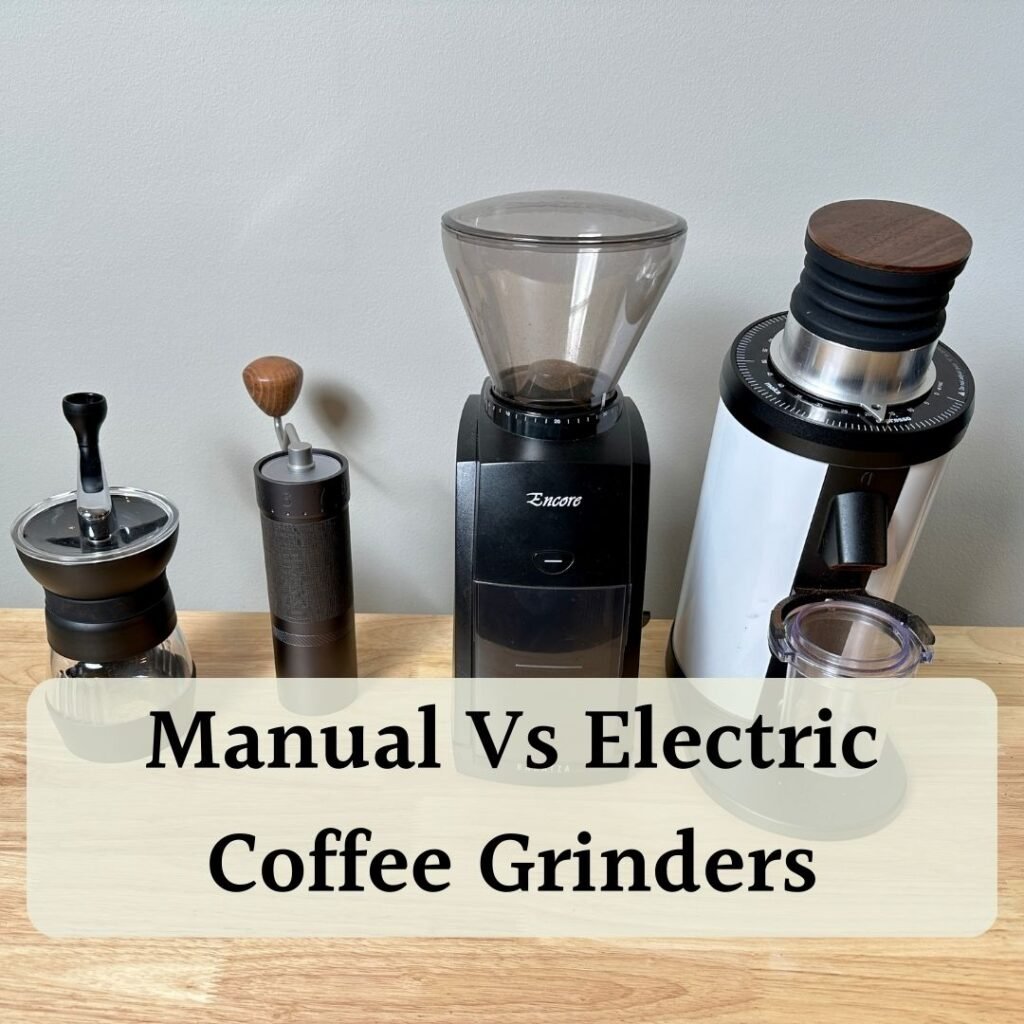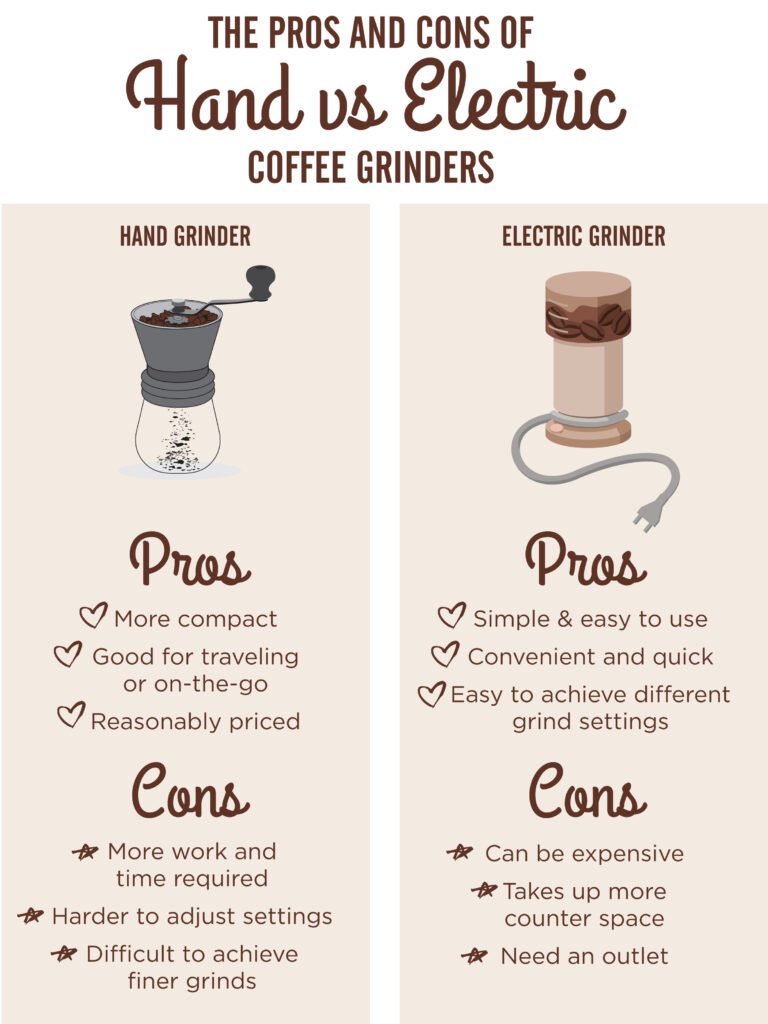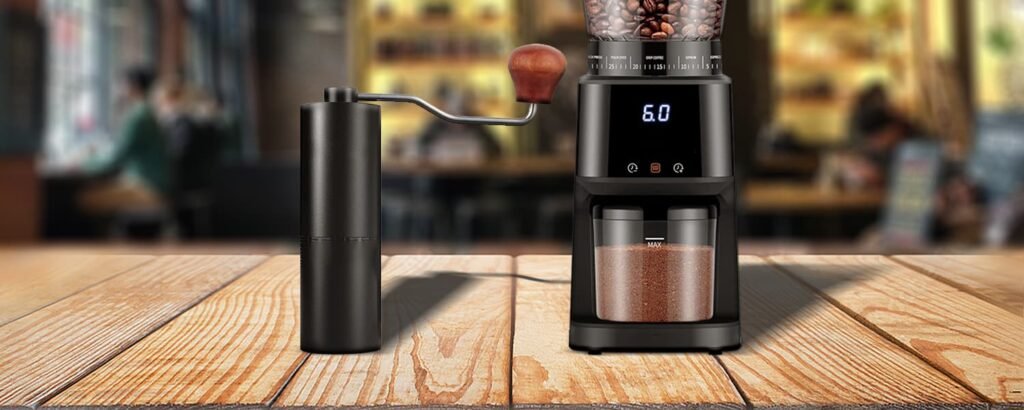In the world of coffee lovers, finding the perfect grinder is essential for that exquisite cup of Joe. But when it comes to choosing between a manual and an electric coffee grinder, the options can leave you feeling a little overwhelmed. Both options have their unique advantages and disadvantages, but fear not, dear coffee connoisseur, as we are here to shed some light on the key differences between these two grinding powerhouses. So, grab your favorite mug, sit back, and prepare to embark on a brewing adventure as we explore the world of manual and electric coffee grinders.

Size and Portability
Manual coffee grinder
A manual coffee grinder is typically smaller and more portable compared to an electric coffee grinder. Its compact size allows you to easily take it on your travels or to use it in small kitchen spaces. Whether you’re going camping or staying in a hotel, a manual coffee grinder can be a great companion for coffee lovers on the go.
Electric coffee grinder
On the other hand, electric coffee grinders tend to be bulkier and less portable compared to their manual counterparts. They require a power source, such as an electrical outlet or batteries, making them less suitable for situations where electricity is not readily available. However, they are ideal for home use and offer convenience with their push-button operation.
Grinding Mechanism
Burr grinder
Both manual and electric coffee grinders can feature a burr grinding mechanism. This mechanism consists of two abrasive surfaces, known as burrs, that crush the coffee beans to produce a consistent grind. Burr grinders are generally considered superior to blade grinders because they offer more control over the grind size and produce more uniform results.
Blade grinder
Some electric coffee grinders, particularly those at a lower price point, utilize a blade grinding mechanism. Instead of burrs, these grinders use sharp blades that rapidly spin and chop the coffee beans. While blade grinders are often less expensive, they are less consistent in terms of the grind size produced. The grind can vary from fine to coarse, resulting in a less precise extraction.
Grind Consistency
Manual coffee grinder
One of the advantages of a manual coffee grinder is the ability to achieve a consistent grind. By manually turning a handle, you have direct control over the speed and pressure applied to the coffee beans, resulting in a more uniform grind size. This consistency is crucial for extracting the full flavor potential of your coffee beans.
Electric coffee grinder
Electric coffee grinders also offer the ability to achieve a consistent grind, especially those with a burr grinding mechanism. However, the grind consistency may vary depending on the quality and price of the electric grinder. Higher-end electric grinders often provide more precise grind settings, ensuring a uniform grind for various brewing methods.
Grinding Speed
Manual coffee grinder
When it comes to grinding speed, manual coffee grinders are generally slower compared to their electric counterparts. The process of manually grinding the coffee beans with a hand crank can take more time and effort. However, many coffee enthusiasts appreciate the ritual and meditative experience of hand grinding, which can add to the overall enjoyment of making coffee.
Electric coffee grinder
Electric coffee grinders excel in terms of grinding speed. With the push of a button, they can quickly and efficiently grind coffee beans in a matter of seconds. This speed is particularly beneficial for those who have limited time in the morning or those making larger batches of coffee.

Ease of Use
Manual coffee grinder
Using a manual coffee grinder is relatively straightforward. Simply load the coffee beans into the hopper, adjust the grind size if applicable, and start turning the handle. While it may require some physical effort, the process is simple and easy to understand.
Electric coffee grinder
Electric coffee grinders are extremely user-friendly. Most models feature intuitive controls and settings, allowing you to adjust the grind size with ease. Simply press a button or turn a dial to start the grinding process, saving you time and effort.
Adjustability
Manual coffee grinder
Manual coffee grinders often offer a range of grind size options, allowing you to customize the grind to suit your preferred brewing method. The adjustability is usually achieved by changing the distance between the burrs, offering a versatile range of grind settings.
Electric coffee grinder
Electric coffee grinders also provide a wide range of grind size options. Depending on the model, you can adjust the grind size by either selecting the desired setting on a dial or by inputting specific settings if the grinder has digital controls. This adjustability ensures that you can achieve the perfect grind for your preferred brewing method.

Noise Level
Manual coffee grinder
One of the greatest advantages of a manual coffee grinder is its quiet operation. Since there are no motors or electrical components involved, using a manual grinder produces minimal noise. This makes it a great option for those who value a peaceful coffee preparation process, particularly early in the morning.
Electric coffee grinder
Electric coffee grinders, especially those with powerful motors, tend to produce more noise during the grinding process. While the noise level may vary depending on the specific grinder, it is generally higher compared to manual grinders. However, the duration of the noise is usually short-lived due to the quick grinding speed.
Price Range
Manual coffee grinder
Manual coffee grinders are typically more affordable compared to electric coffee grinders. They come in a wide range of price points, from budget-friendly options to higher-end models. Investing in a well-designed manual grinder can offer excellent value for money, especially for those who prioritize grind consistency and portability.
Electric coffee grinder
Electric coffee grinders often come with a higher price tag compared to manual grinders. The cost may vary based on the features, build quality, and brand. While they may be a more significant initial investment, electric grinders offer convenience and speed, making them a popular choice for dedicated coffee enthusiasts and those who regularly brew larger quantities of coffee.

Durability
Manual coffee grinder
Manual coffee grinders are known for their durability. Due to their simple design and lack of electrical components, they are less prone to mechanical failure. With proper care and maintenance, a well-built manual grinder can last for many years, providing consistent grind quality over time.
Electric coffee grinder
The durability of an electric coffee grinder can vary depending on the quality of the construction and components. Higher-end electric grinders often feature sturdier materials and precise engineering, resulting in a longer lifespan. However, it is important to note that electric grinders may require occasional maintenance or parts replacement to ensure optimal performance and longevity.
Power Source
Manual coffee grinder
As the name suggests, manual coffee grinders require no external power source. They rely solely on human effort to grind the coffee beans. This makes them an excellent choice for outdoor activities, travel, or situations where electricity is not available.
Electric coffee grinder
Electric coffee grinders, as the name implies, require a power source to function. Most models are designed to be compatible with standard electrical outlets. Battery-powered electric grinders offer more portability but may have limited grinding capacity compared to their corded counterparts. It is important to consider your specific needs and access to a power source when choosing an electric grinder.
In conclusion, both manual and electric coffee grinders have their own unique features and advantages. Manual grinders offer portability, control over the grind size, and a quiet operation, making them ideal for travel and those who enjoy hands-on coffee preparation. On the other hand, electric grinders excel in terms of grinding speed, ease of use, and a wide range of grind size options. The choice between manual and electric ultimately depends on your personal preferences, brewing habits, and lifestyle. Whichever type of grinder you choose, grinding your coffee beans fresh before brewing will undoubtedly enhance the flavor and aroma of your cup of joe.

